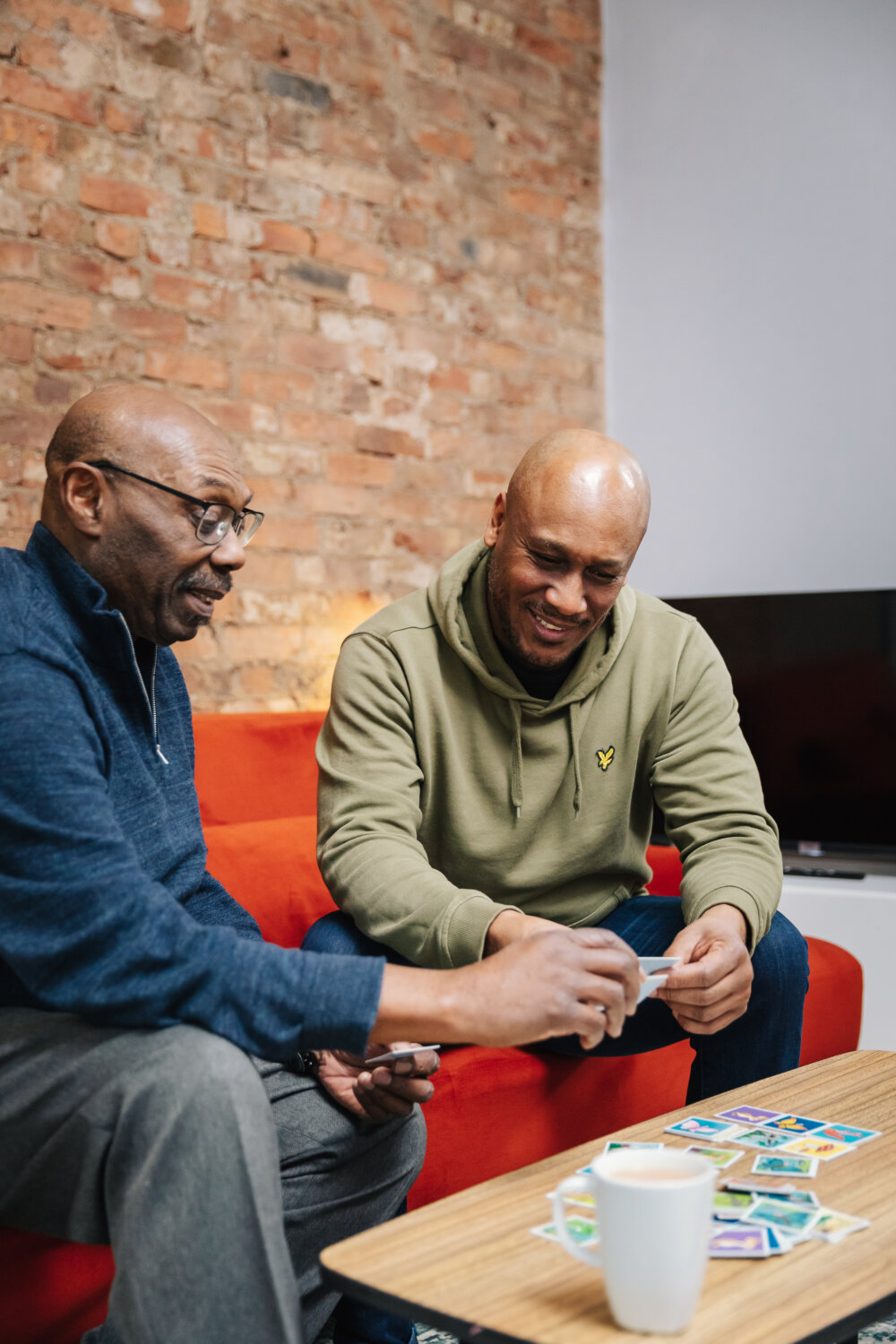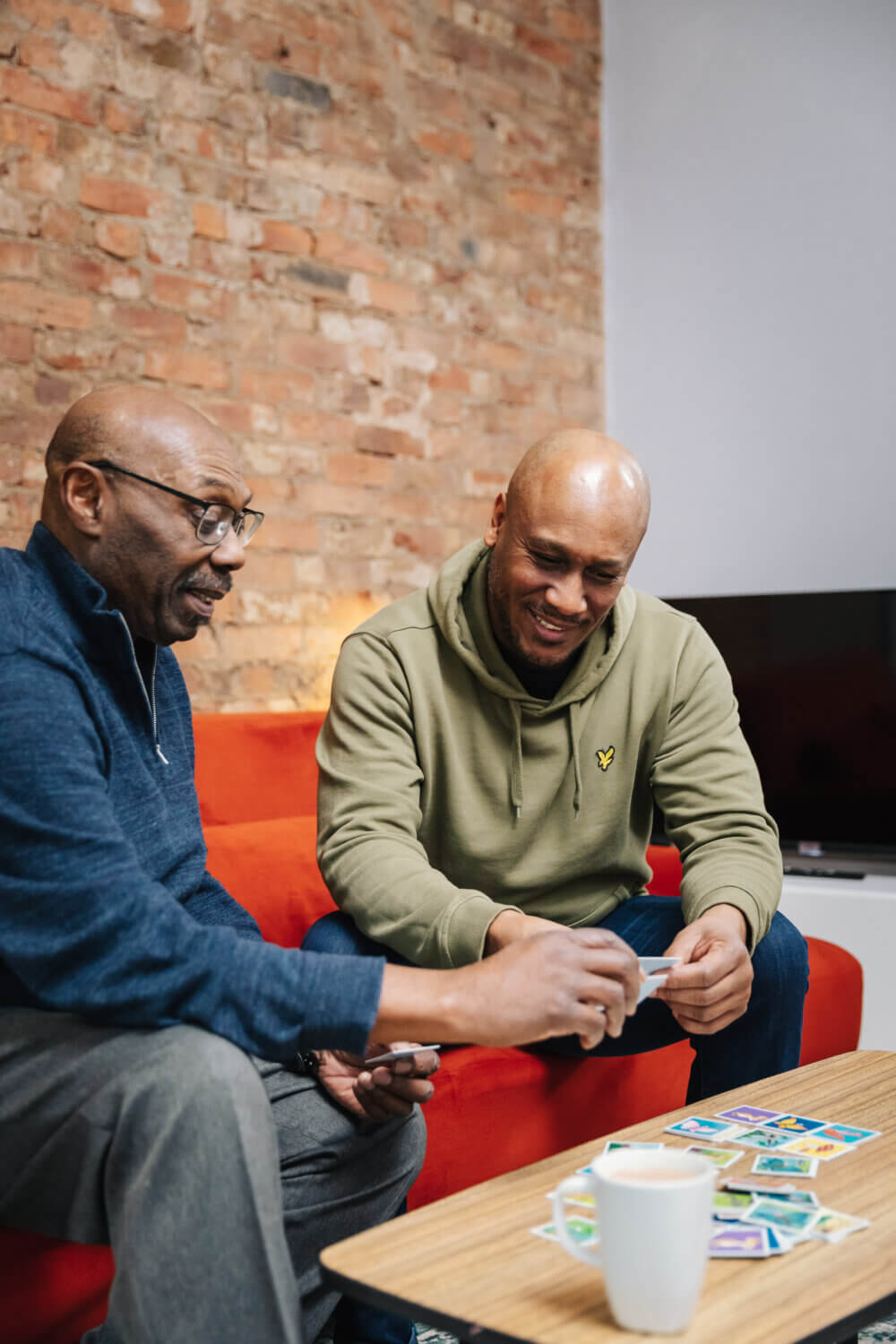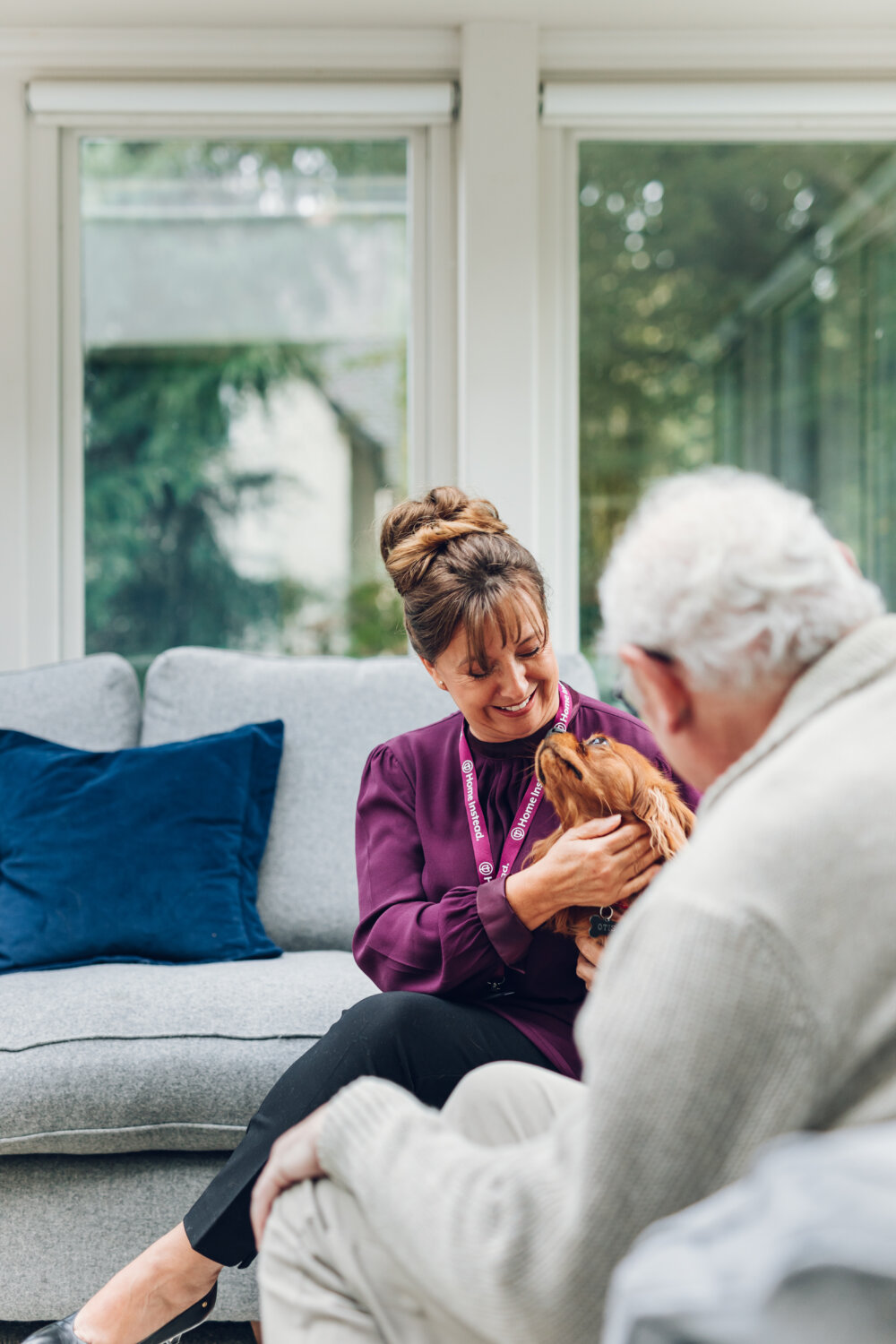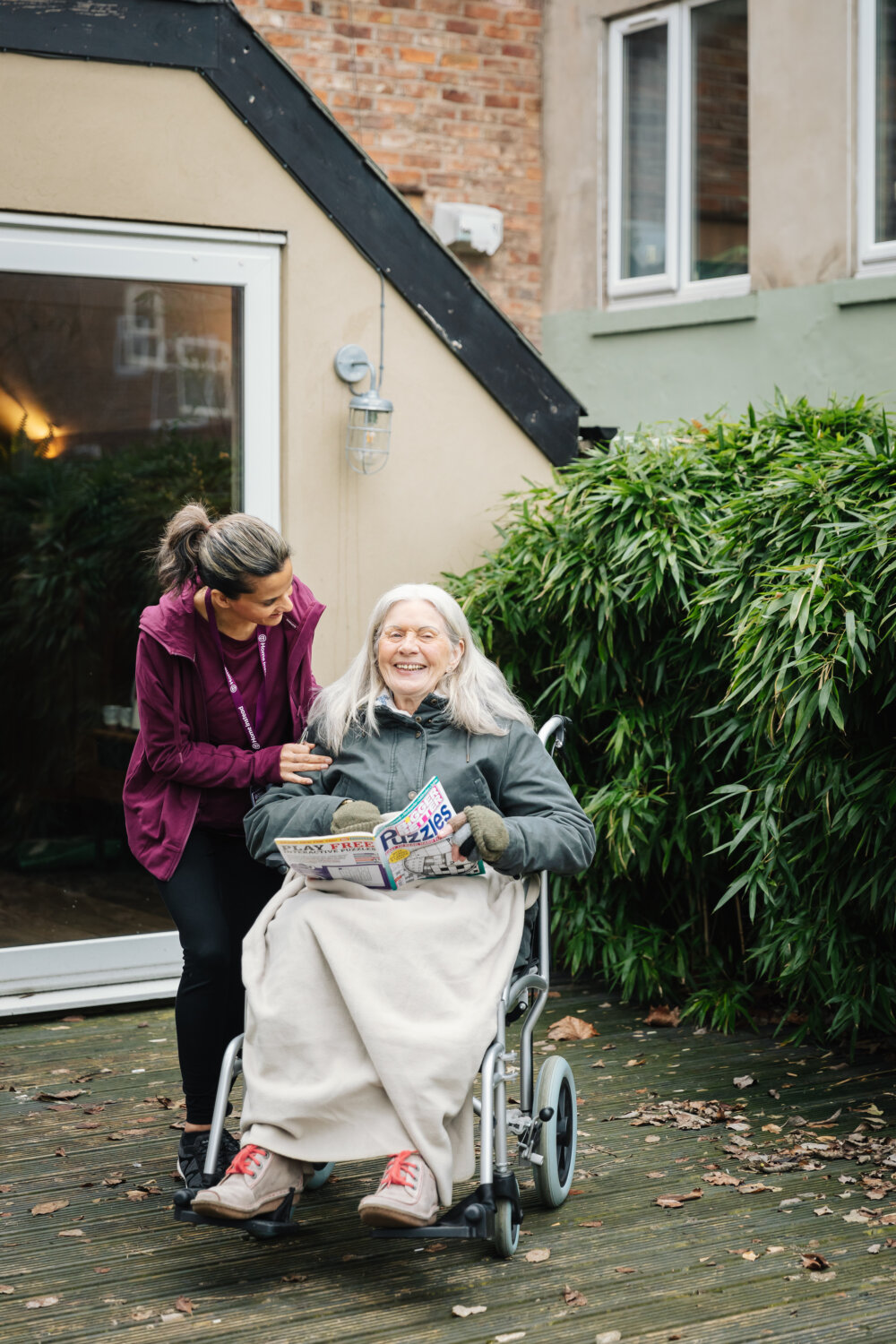Making the care plan work: how to talk to someone with dementia
A Care Plan for someone with dementia is a vital tool that can help guide the actions of everyone involved in a person’s care. However, it is only effective if the person with dementia is on board with the plan. When someone displays common behavioural symptoms of dementia, such as confusion and irritation, it can be difficult to have a conversation with them about their diagnosis and future.
Here, we are looking at how you – as their family member or caregiver – can start making their Care Plan a reality by addressing their concerns and speaking to them directly about the next steps. From the initial conversation about the possibility of dementia, to what to say and do after a diagnosis has been made, to the discussion about needing home care and support, this is your comprehensive guide to having conversations with someone with dementia to create a person-centred Care Plan for them and put this into practice.
If your loved one is struggling to accept they may need help, or you are worried about what you should and should not say to a person with dementia, this guide can make things clearer for you.
At Home Instead, our aim is to help people age positively and in place by bringing expert care to their home. For nearly 20 years, we have been providing the highest standard of care, and creating industry-leading training programmes for our Care Professionals that are accredited by nursing and medical professionals. Today, we are the world’s largest global home care network, supporting over 100,000 older adults with personalised, tailored care at home. So whatever questions you have about dementia care, we can help.
What symptoms does dementia cause?
If you are looking after a person with dementia or someone who you suspect may have this condition, you are probably already familiar with the symptoms it can cause. Dementia is a collective term for a number of progressive neurological disorders that impair cognitive function beyond what is expected with normal ageing, and around 900,000 people currently live with dementia in the UK
You will find more information on this condition in our articles: The Different Types Of Dementia and Managing The Stages Of Dementia
Dementia causes damage to some of the neurons in the brain over time, and common signs and symptoms of dementia that can develop include things like memory loss, disorientation, losing track of time, communication issues, impaired decision making, lack of interest in activities once enjoyed, and struggling with daily tasks.
Another symptom of dementia that you may notice in a loved one is mood and personality changes, and it is often these changes that contribute to the potential distress, anger or denial they may display when faced with the subject of their dementia diagnosis or Care Plan.

Why might someone find it hard to accept they have dementia?
Accepting that you are experiencing cognitive decline and will eventually lose control of your mind and body is an extremely upsetting prospect for anyone. Some of the reasons people may find it hard to accept this can include:
- Fear of stigma
- Worries about losing their independence
- Losing their sense of personal identity
- Requiring help when they are used to doing things for themselves
- Feelings of shame or inadequacy around their cognitive decline
- Facing an uncertain future
- The worry of when end-of-life care will be required
With the support of family members and a structured Care Plan in place which outlines the stages to be expected and what will happen, the person may start to feel more comforted knowing their physical, psychological and emotional needs will be taken care of, and their wishes and preferences listened to.
If you are experiencing resistance from a loved one who may have dementia, you might find our article useful: The Care Discussion: How To Handle An Older Relative Refusing Care
How do I suggest to a loved one that they might have dementia?
Approaching your loved one to discuss a potential case of dementia requires a certain amount of sensitivity and empathy:
- Pick a quiet, private setting to broach the subject, somewhere you won’t be interrupted
- Focus on using a calm tone of voice and gentle language during the conversation
- You may find it best to start by asking them how they have been feeling and how they think their health is
- Mention your concern and assure them this comes from a place of wanting to make sure they access the best care, and that they are safe at home
- Bring up specific examples of times when they may have shown symptoms of dementia, such as memory lapses or confusion
- Listen to their thoughts and reassure them that however they feel about the situation is OK
- Emphasise the importance of seeking a medical evaluation as early as possible to slow any symptoms that may have already started
- Offer to accompany them to appointments and help them with whatever they need – remember the idea of seeking a dementia diagnosis may seem overwhelming to them, so offer as much support as you can to make this process easier
- End the conversation by letting them know you are there for them no matter what happens

How do I encourage my loved one to seek a diagnosis for their symptoms?
The first step after having a conversation about possible dementia is to seek an appointment where the person’s GP can ask questions and carry out the necessary diagnostic tests. It may take several appointments in order to find out more about what is going on and if dementia is in fact the cause of symptoms, but reaching out to organise an initial appointment as soon as you can is key to starting the process. Their GP may refer them to a clinic specialising in dementia conditions in order to gain more insight into what is going on.
If your loved one feels comfortable with you doing so, it can help to attend appointments with them to gather the relevant information, understand more about their condition, and provide emotional support throughout. Your loved one may not feel confident about collecting the relevant information from the GP, so having you there can give them peace of mind.

What will happen at the initial appointment?
At the initial appointment, their GP will usually ask about symptoms and how your loved one is coping with daily activities like getting washed and dressed, cooking meals, going shopping, paying bills and so on. They may also discuss any memory issues experienced by your loved one, as well as accompanying symptoms like depression, anxiety and confusion.
Keep in mind that some of their questions and tests will be to rule out other conditions that may be causing similar symptoms to that of dementia, and could be treated and cured. The GP may choose to do a physical examination, blood tests, urine tests and any other tests they feel could help shed light on the situation.
If dementia is suspected, your loved one’s GP may then refer them to a dementia specialist who can further investigate.
What should I say to my loved one if they receive a dementia diagnosis?
The hours and days following a dementia diagnosis will be extremely distressing for your loved one, and it will undoubtedly upset you and other family members too. In such situations, it is difficult to know what to say to make them feel better.
The best way to support your loved one during this time is often to reassure them that you will be there to help every step of the way, and take on anything you can to ensure they do not have any additional stress during this time (remember you can look into home care and respite care if you are struggling to manage your own life responsibilities around your care duties).
After the dust has settled on the diagnosis and your loved one feels more comfortable discussing what needs to happen next, there are a few things that should be put in place early, such as a Power of Attorney (you can read more about this here) and a Care Plan.
You can read more about this in our article: All About The Care Plan

How should I talk to my loved one with dementia?
Looking after a loved one with dementia can be a difficult balance to strike. On one hand you will want to treat them exactly the same as always to maintain your relationship, but you may find this causes them confusion as their cognitive symptoms progress. On the other hand you may feel the need to adapt the way you speak to them, but feel you run the risk of treating them more like a child than an older relative.
Some adaptation is often needed as your loved one’s condition progresses, and this takes creativity and listening to continue communicating with them in a way that feels comfortable for you and also helps them understand everything that is going on.
Here are some tips for the best ways to communicate with someone with dementia:
- Listen to what they say and make it known you are listening by making eye contact, nodding and smiling at appropriate times. If they feel you are listening they will be more likely to open up about their thoughts and feelings.
- If you don’t understand something they say, encourage them to repeat it and say it back to them in clear language so you can confirm you understand.
- Pay attention to their body language and facial expressions. As their verbal communication changes over time, you may be able to gauge more of how they feel based on other signals.
- Sometimes a person with dementia will struggle to find the correct word or phrase to explain what they mean, which can make them frustrated. Encourage them to explain it in a different way if they are struggling, or if they want something they may be able to describe it instead of naming it directly. Think of ways to help them along, but try not to speak over them or interrupt as it can distract them.
- Give them extra time to respond if they need it, and don’t rush them to finish a sentence or answer a question.
- Allow them to express their feelings fully if they are upset, and try not to dismiss their worries or minimise how they feel.
- As their communication diminishes over time, it may help to use simple, short sentences, focus on using a calmer tone of voice when speaking to them, and speak slower if you think it will help them to understand you better.
- Although their symptoms can become frustrating if you are caring for someone with dementia, always avoid speaking to them as you would a child or being condescending. Maintaining the appropriate level of respect in the relationship is important for both of you.
- Avoid speaking to care professionals or medical professionals about them as if they are not in the room. Where possible, always include them in the conversation by explaining what is happening, even if they cannot answer or get involved.
- When misunderstandings inevitably happen, try to laugh about them together. You don’t want the person to feel like you are laughing at them, but making light of situations where possible can help to keep their spirits up.
- Reassure them during conversations by nodding, smiling, and – if they respond well to physical touch – hold their hand or stroke their arm to let them know you are there to help if needed.
Is there anything I should avoid saying or doing?
It is important to prepare for situations where your loved one might feel frustrated and lash out in a way that could upset you. It is typically best to avoid things like correcting their memories about past events, using complex language, speaking in slang words or metaphors, pressuring them into doing something they do not want to (unless this is something that will benefit their wellbeing), changing their routine drastically, patronising them, or putting them in situations where they may feel overstimulated and overwhelmed.
Over time you may start to recognise the words, statements and actions that upset, anger or distress them, and can take steps to avoid these situations where possible. Or, by properly managing them when they arise, you can calm your loved one and avoid making things worse.

How do I get them to accept they may need additional help?
Your loved one’s health and cognitive abilities will likely deteriorate to a point where they need more help. If they choose to remain in their own home, they may require home care to stay safe and comfortable there. This care can come from either yourself or a care professional, but either way it requires structure and organisation to put in place and maintain. If your loved one refuses to accept they need help from anyone, this can become a problem.
Have patience with their decision to accept care, and validate their emotions and concerns by addressing each one and offering a solution for how you can both tackle this together. For example, if they are worried about losing their independence you can assure them of what you think will help them to keep this for as long as possible, such as making home adaptations so they can remain safe at home alone, or bringing in an overnight carer to ensure they have everything they need when you are not there.
It can also help to share examples of how others with dementia have benefitted from home care and other types of support, and include your loved one in the decision making process, such as allowing them to meet potential carers and decide if they could be a good fit.
Emphasise your unwavering support and commitment to their wellbeing, and let them know your suggestions are to help them feel safer and happier while also addressing your needs as a carer. If you are planning to care for your loved one full time, you can find more information in our article: Becoming a Full Time Carer For A Family Member
How do I bring up their advancing needs and suggest home care?
As your loved one’s care needs evolve over time, eventually they may have specific medical requirements or care needs, and decisions must be made about whether they will move into a care home, nursing home or remain in their own home. You can read more about which option could be best in our article: The Benefits Of Home Care vs A Care Home
Home care can be a positive option for people with dementia; a 2013 study found those living with dementia at home experienced higher activity levels, quality of life, and felt more socially connected than those living in a care home, while another study found that after one month of home care, participants were less likely to develop acute confusion than those living in a care home.
The benefits of home care may be clear to you, but your loved one might feel apprehensive about admitting they need more help, accepting help from a stranger, or accepting help from their family members. If you plan to be involved in your loved one’s care, you may find our article useful: Caring For Someone With Dementia At Home
It is best to acknowledge the areas they may be struggling with now, for example if they are finding personal care activities difficult (such as getting dressed or cooking), or their mobility limitations are causing safety concerns. Try to include them in the discussion; instead of telling them you are bringing in home care, allow them to acknowledge their own struggles and be part of brainstorming solutions – these can include home care, and you can find more information on this in our article: How To Choose & Arrange Home Care Services

At Home Instead, our award-winning dementia care means your loved one will always be in safe hands, whether they require companionship, home help, personal care, specialised dementia care, or something else. Our Care Professionals are highly trained to deliver the bespoke services you need, so no matter what type of home care you require, we can provide a tailored service that suits you or your loved one – reach out to the team at Home Instead to learn more.
Home Instead is an award-winning home care provider and part of a worldwide organisation devoted to providing the highest-quality relationship-led care for older people in their own homes. Arranging care for yourself or your loved one shouldn’t be stressful, so whatever questions you would like answered, feel free to reach out to the Home Instead team to discuss your needs.